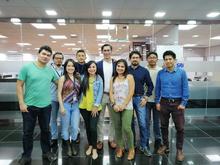Export supply chains in Ecuador

Fair trade, direct source, sustainably grown — these terms have become commonplace in our consumption of food. Behind them lies the powerful economic idea that paying a premium for goods produced with fair working conditions and sustainable farming practices promotes the development of a robust global food system. However, we have a limited understanding of how this idea works in practice, in part because agricultural supply chains are highly fragmented across businesses and countries, so it can be hard to trace profits.
As part of my dissertation, I use a highly detailed dataset from Ecuador, one of the world’s most important producers of agricultural goods such as cocoa and shrimp, to investigate how the profits from global trade are distributed among different actors such as farmers and exporters. My preliminary analysis indicates that exporters earn a larger share of profits than farmers in general and that the share varies substantially depending on the particular product.
This summer, thanks to generous funding from the MacMillan International Dissertation Fellowship, I traveled to Ecuador to gather qualitative evidence on institutional factors that can help explain these quantitative results. By interviewing people with experience in the export sector, I learned about the intricacies of producing and trading different products. For example, coffee and cacao are produced across many small farms, so businesses focus on improving the local infrastructure for exporting. In contrast, banana and flower production is relatively concentrated, so businesses focus on improving access to international markets.
Through additional conversations with government officials, I gained an understanding of the recent government policies that affected the agricultural sector, such as minimum prices for farmers and exporters of certain products. Together, these insights will inform the next phase of my analysis, in which I will isolate the effect of institutional factors, e.g. minimum prices, on profits and predict the effect of changing those factors, e.g. raising or lowering the minimum. The results will help inform an ongoing debate about how to promote sustainable export supply chains in Ecuador.
Finally, I taught a course on statistical programming at the central office of the Tax Authority. Over 30 analysts from across the agency attended the course, which covered the basics of data manipulation and analysis. While educational resources for computer programming abound at Yale, they are less prevalent in other parts of the world. As grateful as I am for the insights I gained from my interviews, I am more grateful still for the opportunity to give back to the people who so generously shared their data and knowledge with me.
Written by Lucas Zavala, Graduate School of Arts & Science, 2021 (Economics).
